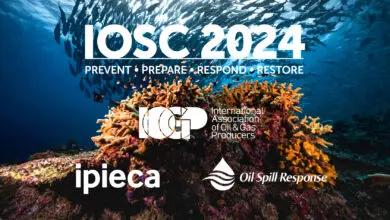
3 questions… on how IOGP helps its members reduce their carbon emissions footprint
In each edition of Pulse we publish a short interview with an IOGP colleague or committee member. This month’s interview is with Wendy Brown, IOGP’s Environment Director. Wendy is based at IOGP’s Headquarters in London, and kindly agreed to this short interview on how the Association supports its members in their efforts to help fighting climate change.
How important is climate change for IOGP’s members?
A recently conducted member survey confirmed very clearly what we have been experiencing over the past years: climate change and the energy transition are the two most pressing and priority challenges faced by the industry, notwithstanding the rapid emergence of the Coronavirus and economic crises. We have been focusing on these topics for quite a while: we became a supporting organisation to the Methane Guiding Principles in 2018 to help ensure they are applied as widely as possible along the whole gas supply chain; and have recently published IOGP Report 630 – Comparison of Methane Reporting Requirements. It compares different methane emissions measurement methodologies and emission factors for upstream oil and gas operations, and highlights areas where members’ need to focus their efforts on improving accuracy of methane emissions data. We have also been working to improve the accuracy and transparency of the upstream industry’s annual methane emissions data published by IOGP each year. IOGP also coordinated a major study in 2018/19 for the European Commission on the potential of Carbon Capture and Storage (CCS) and Carbon Capture Utilisation and Storage (CCUS) technologies in Europe, and how to facilitate large scale deployment, and have prepared a number of useful CCS resources.
What can members expect from IOGP in 2020 in this context?
We have a lot of projects in the pipeline. For example, the Energy Efficiency Indicator Task Force aims to develop a common upstream energy efficiency indicator. A pilot benchmarking exercise is being undertaken with three third party consultants, and eight IOGP Member Companies are participating. We want to develop a common agreed approach for upstream companies to compare similar asset types and allow them to identify opportunities for improvement in energy efficiency at asset/process level.
Another example is our cooperation with the efforts of the IOGP Engineering Leadership Council (ELC) and the Standards Committee to identify areas where engineering standards and IOGP operator technical sharing and collaboration can potentially contribute to progressing the Low Carbon Agenda. This has great potential to help drive step changes in reducing our carbon footprint if we can develop and rapidly adopt common lower carbon engineering standards across the industry.
A major study, ‘Hydrogen for Europe’, funded by a consortium of industry organisations including IOGP, is also ongoing by research institutes SINTEF and IFPEN, to assess the current knowledge about the potential hydrogen has to decarbonise the European economy; delivery is expected at the end of 2020.
Many other associations and organisations are working on similar topics. How does IOGP engage with them?
At IOGP, we strive to find synergies and develop collaborative initiatives with other organisations whenever possible. This has led to close working relationships with organisations such as OGCI and IPIECA. The update of the ‘Flare Management Guidelines’ (IOGP 467) provides an example of this; it is a joint project between IPIECA, IOGP and the World Bank’s Global Gas Flaring Reduction Partnership (GGFR). Together, we are developing a guide that is intended for audiences beyond the oil and gas industry, to include governments and regulatory bodies – to help achieve the global Zero Routine Flaring goal.
With OGCI and IPIECA we are proposing to prepare a set of recommended practices for methane emissions measurement technologies that would provide Member Companies with an upstream standard approach for identification and quantification of methane emissions.
And, with other signatories and supporting organisations of the Methane Guiding Principles (MGP), we are raising awareness of the benefits of implementing the MGP ‘Reducing Methane Emissions: Best Practices’ (based on similar approach to the IOGP’s ‘Life Saving Rules’) to advance implementation of strong performance consistently across the industry, and engaging with EU regulators to advocate sound policy and regulation



